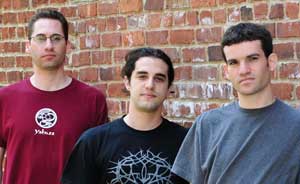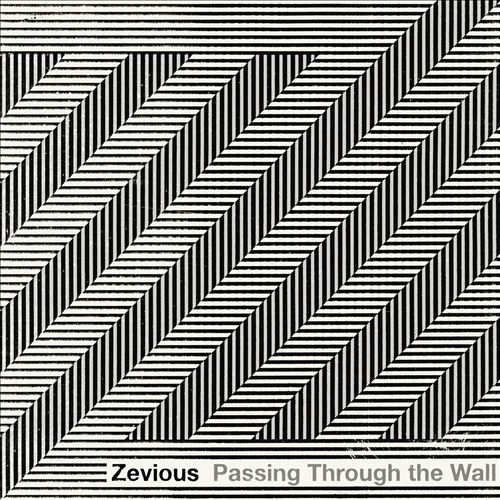
Zevious used to be a jazz guitar trio. Their 2007 self-titled debut CD featured a set of knotty jazz compositions and technical soloing that the group performed at jazz clubs. Very quickly thereafter, by the beginning of 2008, the band had broken away from the bonds of tradition and were developing a sound that had been developing and incubating since their first album. Mike ditched the jazz guitar for a Telecaster and DeBlase replaced his upright with an electric bass and they both picked up distortion pedals and cranked them up. Zevious began combining progressive rock grooves, tech metal, structured group improvisation, and complex song forms with a conventional jazz sound, creating a unique compositional style. Their new sound points towards a focused musical ground where it is apparent that this band can shred. Their songs now wind through peaks and valleys of odd-metered and hard-hitting bass and drum grooves with contrapuntal guitar interjections that morph into unison riffing, with hard-hitting, complex drum workouts and stop-on-a-dime style guitar breaks coupled with subtle, brooding segments.
"If your thing musically is the prototypical, gnarly, and loud instrumental power trio, then Zevious should be right up your alley. Led by new electric guitar hero Mike Eber, this band should wipe the floor with any comparable group that dares to perform with such a bold, in-your-face posture. Though claiming various primal jazz fusion influences, the unmistakable sound of Robert Fripp and King Crimson from their trio period and the seminal album Red cannot be denied. You also hear the British Canterbury concept via Gary Boyle or Alan Holdsworth, a little bit of the progressive sound of the Muffins, and even pieces of Frank Zappa, the jazzier Jeff Beck and Robin Trower, or Gary Lucas creeping in alongside a punk attitude. With brother/drummer Jeff Eber and bassist Johnny DeBlase (love that name) Zevious makes inroads toward establishing a new fusion amalgam in varying tones and shapes. Everything here is short, concise, and to the point, whether it be on the choppy flailing during "Come Cluster" and chord driven "iNCITING," the jarring noisy or alternately serene contrasts in "The Children & the Rats," the bass-shaded, underground, and litigious "That Ticket Exploded," and slowed, dank, unassuming, deliberate "Gradual Decay". Where Mike Eber's personal voicings come further to the surface on the goth power rocker "Mostly Skulls" with cleverly omitted measures, it is on the title track that he's in a diffuse and neo-laconic element, far beyond the pale. He's practically fluid in his steel-trap, deadly technique for "The Noose," straight-up funky on "Glass Tables," and evokes the snarly Fripp sound in a fast-paced "The Ditch." The opening track, "Where's the Captain?," gives a good indication that Robert Fripp's schizoid man, somewhat R&B-nfluenced, hard-edged, dark guitar is at the center of this trio's core. Listen to this recording and Red back to back to see if you don't agree with the parallel universe this band exists in. Where Zevious definitely suggests a Zen-like concept welded onto a deviated (or even devious) attitude, you'll find the music is fully realized, a terrible wholeness reflective of today's societal anxiety and tenseness released -- nay shot out of a cannon -- into the ether." – All Music Guide
 PASSING THROUGH THE WALL RUNE 367 |
"Zevious split the difference between the Tony Williams Lifetime and the 80s Downtown scene...[they make] algebraic music feel wholly organic , almost swinging." ñ Jazz Times The music here is a hypnotizing blend of intricate, locked-in interaction and red-hot energy that will remind you that sometimes the letters 'L-O-U-D' can spell 'jazz'. Zevious will also remind you that sometimes the most influential jazz is controversial. According to the band, the goal on Passing Through the Wall is to induce a trance-like state in the listener through repetition, non-conventional melody and challenging song structure. The compositions are based around large cycles of layered poly-rhythmic patterns against octave displaced melodies; the individual parts working together to create dense, pulsating textures. |
 AFTER THE AIR RAID RUNE 287 |
"The music of Zevious shrewdly juxtaposes order and its opposite: structural intensity pushed to its breaking point in the most appealing way. These boys are brilliant and fearless." ñ Vijay Iyer "...Zevious is for anyone who loves aggressive, rock-oriented improv with grooves and some semblance of a song...these guys put their music degrees to work...letting us know that being intense doesnt mean you can't have arrangements and following a script doesnt mean you can't let your hair down." ñ DownBeat Zevious are a unique electric jazz band for the modern era. This instrumental power trio are equally influenced by the sound of early John McLaughlin/Tony Williams Lifetime, Meshuggah, the 'downtown punk-jazz-harmolodic' school (James Blood Ulmer/Music Revelation Ensemble, Decoding Society, Curlew), Magma, Vijay Iyer and Ben Monder among others. This is not your father's jazz band. Their second album After the Air Raid is the culmination of nearly two years of hard compositional and rehearsal labor and showcases a powerful, rhythmically intense and highly structured sound, making this a record with lasting depth. Beautifully and simply recorded, mixed and mastered by Colin Marston (of Behold...the Arctopus), the striking live sound of the band is masterfully presented. "In form, Zevious is a traditional power trio of electric guitar, bass and drums. But the group didn't start out this way in 2006, when it featured an acoustic jazz format. With the substitution of electric instrumentation and distortion pedals in 2008, its approach to music changed, but its grounding in group improvisation remained. After The Air Raid is a genre busting brawny recording that leans more towards technical metal than jazz. That said, the trio favor odd-metered grooves and a rocking beat. Guitarist Mike Eber, also a member of the bands Smother Party and Mea'l, wrote seven of the tracks, bassist Johnny DeBlaze the other four. The band juxtaposes quiet intensity against noisy distortion on "The Children And The Rats," culminating in a silent stoppage. Zevious favors the thunderous bassline over a swing one, but retains the skill of a jazz band. Its quiet/loud approach makes for a winning sound." ñ All About Jazz "Zevious is devious. It may look like your everyday electric jazz trio (guitar, bass, drums), but Zevious is anything but typical. Guitarist Mike Eber, bassist Johnny DeBlase, and drummer Jeff Eber give off the aroma of jazz-flavored metal, but their sophistication - odd-metered rhythms, unexpected harmonic ideas - slyly bubbles up. Their influences range wide: Thereís a little bit of fusion forebears John McLaughlin and Tony Williamsís Lifetime in here, some electric free improv in the vein of Nels Cline and Last Exit, and nu-metal a la Rage Against the Machine. Compositionally and rhythmically, though, their next of kin are modern acoustic improvisers, folks like Vijay Iyer and Ken Vandermark. The interplay between the Eber cousins is central. The drummer states the beat and then finds a way to play around it, while the guitarist first plays the ìright chordsíí and then harmonizes against them, often in ways that are deliberately unsettling. Even when they turn it down - as they do on the title tune, an eerie duet between guitar and bass - the music is both frightening and beautiful." - boston.com |
PRESS RELEASES
Passing Through the Wall press release
After the Air Raid press release
After the Air Raid press quotes
